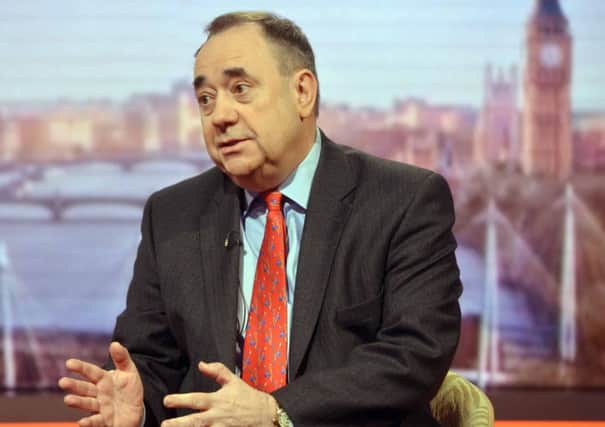Gordon Brown vow ‘did not sway referendum result’


An Edinburgh University survey of more than 4,500 people has revealed that just 3.4 per cent of No voters said the offer of more powers was the main motivation for their decision.
Rather, it was No voters’ feelings of Britishness and their doubts about the economics of breaking up the UK that led to them rejecting Scottish independence.
Advertisement
Hide AdAdvertisement
Hide AdThe study also found that a majority of people born in Scotland (52.7 per cent) voted Yes.
When No voters were asked why they had come to their decision, 29.5 per cent cited their feelings of Britishness and their belief in the Union.
Just over a quarter (27.8 per cent) said there were too many unanswered questions about independence and 26.3 per cent said going alone would have made Scotland worse off.
The proportion of people who said they wanted to vote Yes but felt it was too risky was 5.3 per cent. Meanwhile, 5.2 per cent gave a lack of trust in Mr Salmond as a reason for voting No – a higher percentage than those who cited the “vow” as their main motivation.
The reasons given for voting No contrasted dramatically with Yes voters’ perceptions of why their fellow countrymen and women did not support independence.
As part of the exercise Yes voters were asked to identify what they believed had motivated No voters.
The study found 41.3 per cent of them replied “Westminster leaders misled Scots over more powers”.
A further 17 per cent cited “the press/BBC bias towards No”.
Advertisement
Hide AdAdvertisement
Hide AdThe percentage who felt “the electorate lost its nerve” came to 11.8 per cent.
Warnings from banks/business about Yes accounted for 11.2 per cent.
On the two campaigns, 7.9 per cent of Yes voters said Better Together ran a negative campaign while just 0.9 per cent reckoned Yes Scotland ran a poor campaign.
Since losing the referendum, Mr Salmond has suggested that “the vow” underwritten by former prime minister Mr Brown in the dying days of the campaign was the key factor that halted the Yes Scotland juggernaut. In interviews, the former First Minister has said the vow was the turning point.
But one of the study’s authors, Professor Ailsa Henderson, said the research suggested differently. She said: “There is clearly a divergence between the perception among Yes voters that the offer of more powers was an important aspect of the campaign and reality of how No voters reached their decision.
“The issue of ‘more powers’ is not cited as the main reason for voting No. However, Yes voters are convinced it caused a loss of nerve leading to support for the Union.”
The findings from the Scottish Referendum Survey is to be presented today in a seminar at Edinburgh University’s Department of Politics and International Relations.
Prof Henderson and her co-author Professor James Mitchell will deliver the research. The other members of the research team are Professor Chris Carman of the University of Glasgow and Dr Rob Johns of the University of Essex.
Advertisement
Hide AdAdvertisement
Hide AdLast night Dr Johns said: “It is not unusual for a misleading narrative to develop about what swung an election or referendum. According to our data, anyone who thinks ‘it was the Vow wot won it’ is exaggerating, to say the least. However, once these narratives develop, they can be hard to shift.”
When the sample was broken down by where people were originally from, it found most (52.7 per cent) of those born in Scotland voted for independence. That contrasted with voters born elsewhere in the UK of whom 72.1 per cent voted No. Most of those born outside the UK voted No (57.1 per cent).
When the gender of voters was examined it found that the majority of women voted No (56.6 per cent). While more men (53.2 per cent) voted Yes.
The Scottish Government’s move to extend the franchise to 16 and 17-year-olds could also be examined when the survey was broken down by age. The research found 62.5 per cent of 16-19-year-olds voted Yes, although the academics pointed out that this was only an estimate based on a small sample in that age group. In contrast almost two-thirds (65.7 per cent) of over 70s were No voters. When it came to those in their sixties, 56.3 per cent were against independence.
Aside from teenagers, the age group most in favour of independence were in their 30s with 53.9 per cent of them voting Yes.
Only 1.4 per cent of those surveyed changed their minds as a result of watching the television debates. Analysis of Yes voters showed that 24.8 per cent were for independence because it would mean Scotland always getting the government for which it had voted. A similar percentage (24.1 per cent) of Yes voters said they thought the Westminster system was rotten.
A Scottish Labour spokesman said: “The SNP government drew up the rules on who should participate but seem reluctant to accept the result of what was supposed to a ‘once in a generation’ vote.”
Scottish Conservative chief whip John Lamont said the research showed people voted No for “bigger reasons” than the vow.
Advertisement
Hide AdAdvertisement
Hide AdThe SNP MSP Christian Allard said: “Polling conducted immediately after the referendum showed that a quarter of No voters regarded the promise of extra powers as important in informing their decision – and nearly 10 per cent of No voters only made up their mind in the last week.”
FOLLOW US
SCOTSMAN TABLET AND MOBILE APPS